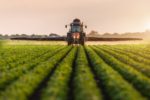The power of partnerships and wind

Major global events have increased the profile of environmental issues in business. The United Nations Sustainable Development Goals have been launched; boards are acknowledging their fiduciary duties to disclose climate-related risk; and the Paris Agreement has been ratified, to cite just three. The Paris Agreement has generated a ripple effect and now individual countries, sectors and organisations have announced their own aspirations to contribute to the global 2°C goal. “The project will provide significant environmental benefits and substantial support to the local community and regional economy.” – Rebbeck Environmental markets are also impacting companies’ bottom line while barely a day goes by without Australian mainstream media …










